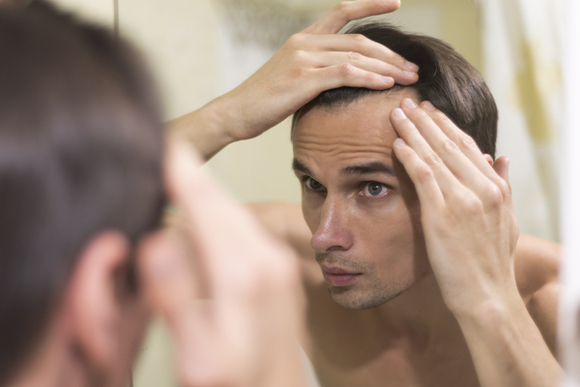Testosterone is a crucial hormone that plays a vital role in the overall health and well-being of both men and women. It is primarily produced in the testes of men and the ovaries of women, with smaller amounts also produced by the adrenal glands.
This powerful hormone is responsible for a wide range of functions, including the development of male sexual characteristics, bone and muscle growth, red blood cell production, and the regulation of libido.
However, as we age, our testosterone levels can naturally decline, leading to a host of potential health issues. One of the lesser-known consequences of low testosterone is its connection to hair loss.
In this comprehensive article, we will delve into the intricate relationship between testosterone and hair loss, exploring the causes, research, and effective treatment options to help you regain control of your hair health.
Quick Summary
Low testosterone levels do not directly cause hair loss, but they may lead to reduced DHT production, affecting hair follicle sensitivity to DHT binding in genetically susceptible individuals
The Connection Between Low Testosterone and Hair Loss
While the causes of hair loss can be multifaceted, one of the key factors that is often overlooked is the role of testosterone. Testosterone, a male sex hormone, is crucial for maintaining healthy hair growth and preventing hair loss in both men and women.
Testosterone plays a vital role in the hair growth cycle by stimulating the hair follicles and promoting the production of new hair strands. When testosterone levels are low, the hair follicles can become miniaturized, leading to thinner, weaker hair and ultimately, hair loss.
Furthermore, low testosterone can also contribute to other factors that exacerbate hair loss, such as increased inflammation, oxidative stress, and hormonal imbalances. These additional factors can further disrupt the delicate balance of the hair growth cycle, resulting in accelerated hair loss and thinning.
Common Causes of Hair Loss in Men and Women
Hair loss, also known as alopecia, is a common condition that affects both men and women. While the causes can vary, some of the most prevalent factors include:
- Genetics: Hereditary hair loss, or androgenetic alopecia, is the most common type of hair loss, affecting an estimated 50 million men and 30 million women in the United States alone.
- Hormonal imbalances: Fluctuations in hormones, such as thyroid disorders, polycystic ovarian syndrome (PCOS), and androgen excess, can contribute to hair loss.
- Stress and trauma: Extreme physical or emotional stress can trigger a type of hair loss called telogen effluvium, where the hair follicles are pushed into the resting phase prematurely.
- Medications: Certain medications, such as cancer treatments, antidepressants, and blood thinners, can sometimes lead to hair loss as a side effect.
- Nutritional deficiencies: A lack of essential vitamins and minerals, including iron, zinc, and protein, can impair hair growth and lead to thinning.
Research and Studies on the Link Between Low Testosterone and Hair Loss
Numerous studies have explored the relationship between low testosterone and hair loss, providing valuable insights into this connection.
One study, published in the Journal of the American Academy of Dermatology, found that men with androgenetic alopecia (male pattern baldness) had significantly lower levels of testosterone compared to those without hair loss.
The researchers concluded that low testosterone levels were a significant risk factor for the development of this type of hair loss.
Another study, conducted by the University of California, Los Angeles, investigated the link between testosterone and hair loss in women.
The findings revealed that women with polycystic ovarian syndrome (PCOS), a condition characterized by elevated androgen levels, were more likely to experience hair loss compared to women without the condition.
Additionally, a review published in the Journal of the American Academy of Dermatology examined the role of testosterone in hair growth and loss.
The researchers concluded that testosterone and its metabolites play a crucial role in the regulation of hair follicle function and that imbalances in these hormones can contribute to various forms of hair loss.
Signs and Symptoms of Low Testosterone
Recognizing the signs and symptoms of low testosterone is crucial for identifying and addressing the underlying cause of hair loss. Some common signs of low testosterone include:
- Decreased sex drive
- Erectile dysfunction
- Fatigue and low energy
- Decreased muscle mass and strength
- Increased body fat
- Mood changes, such as depression or irritability
- Difficulty concentrating
- Reduced bone density
If you are experiencing any of these symptoms, it is important to consult with a healthcare professional to determine the underlying cause and develop an appropriate treatment plan.
Treatment Options for Low Testosterone and Hair Loss
Fortunately, there are several effective treatment options available for addressing low testosterone and its impact on hair loss. These include:
- Testosterone replacement therapy (TRT): This involves the administration of supplemental testosterone, either through injections, gels, or patches, to restore normal testosterone levels.
- Medications: Certain medications, such as finasteride and minoxidil, can help to block the conversion of testosterone to dihydrotestosterone (DHT), a potent androgen that can contribute to hair loss.
- Nutritional supplements: Supplements containing essential vitamins and minerals, such as biotin, iron, and zinc, can support healthy hair growth and prevent deficiencies.
- Lifestyle changes: Adopting a healthy diet, engaging in regular exercise, and managing stress can help to maintain optimal testosterone levels and promote overall hair health.
Lifestyle Changes to Promote Healthy Testosterone Levels and Prevent Hair Loss
In addition to medical treatments, there are several lifestyle changes you can implement to help support healthy testosterone levels and prevent hair loss:
- Engage in regular exercise: Resistance training, such as weightlifting, has been shown to increase testosterone production.
- Maintain a balanced diet: Incorporate foods rich in zinc, vitamin D, and healthy fats, which are essential for testosterone production.
- Manage stress: Chronic stress can disrupt hormone levels and contribute to hair loss, so it’s important to find healthy ways to manage stress, such as through meditation, yoga, or counseling.
- Get enough sleep: Adequate sleep is crucial for maintaining healthy testosterone levels, as the body produces most of its testosterone during the night.
- Avoid excessive alcohol consumption: Heavy alcohol use can lower testosterone levels and contribute to hair loss.
Conclusion
In conclusion, the link between low testosterone and hair loss is a complex and often overlooked issue. By understanding the role of testosterone in hair growth, recognizing the signs and symptoms of low testosterone, and exploring the available treatment options, individuals can take proactive steps to address this problem and regain control of their hair health.
If you are experiencing hair loss and suspect it may be related to low testosterone, I encourage you to schedule an appointment with a healthcare professional, such as a dermatologist or endocrinologist, who can help you identify the underlying cause and develop an effective treatment plan.
Don’t let hair loss negatively impact your confidence and quality of life – take action today to address this issue and reclaim your healthy, vibrant hair.

